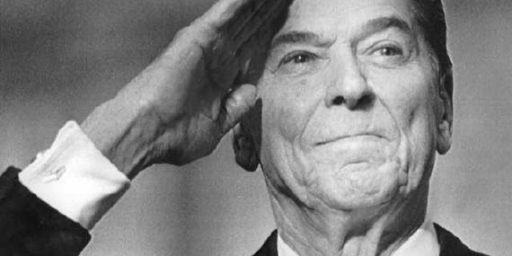John Roberts and Article II
Hugh Hewitt, who once coached John Roberts in basketball, argues that in addition to a brilliant mind and unreproachable integrity, his former charge brings something unusual to the Bench: Significant executive branch experience.
The four years that John Roberts served as associate counsel to President Reagan under Fred Fielding and Deputy Counsel Dick Hauser, from 1982 to 1986, has been widely noted in the biographical profile of President Bush’s nominee to replace Justice O’Connor, but it is passed over quickly on the way to noting Roberts’s extraordinary record as an advocate before the SCOTUS as both a lawyer for clients and as a representative of the United States government. That service is one of the many reasons why Judge Roberts will make an outstanding Supreme Court jurist.
I do not believe that any previous Supreme Court justice has served in the White House Counsel’s office. The Counsel’s office is often called the most exclusive law firm in the world as it is both small–in the Reagan years, the office was at seven or eight lawyers–and devoted to the needs of a single client, the president. As a one-client firm, the lawyers at work there had a unique focus on Article II of the United States Constitution. Almost every Supreme Court justice arrives at SCOTUS well versed in his or her Article III duties and rights, and most have a great deal of experience with the Article I powers of the Congress, since most cases and controversies that come before federal judges connect at some point with Congressional enactments.
But only lawyers with vast executive branch experience really appreciate Article II and the role of the executive, and few are as well versed in the powers of the presidency–and its limits–as veterans of the West Wing lawyers’ club.
For four tumultuous years of the Reagan presidency, Judge Roberts was close at hand as Ronald Reagan navigated the course of the country’s recovery from economic crisis and the Vietnam Syndrome. This was the era of the deployment of the cruise missiles and Pershing IIs in Europe, of Grenada and the massacre of Marines in Lebanon, of the “Evil Empire” speech. Roberts observed and participated in one of the critical passages of American history, a period in which “energy in the executive,” to use Hamilton’s phrase from Federalist 70 helped the nation recover from the disastrous decade of the ’70s.
This experience, and of course Roberts’s years as deputy solicitor general, will equip the new justice more than most of his predecessors with an ear for arguments about the need for presidential power in areas where that power is crucial, as in the GWOT.
Roberts’s background most closely resembles that of Justice Robert Jackson, whose concurring opinion in the Steel Seizure cases remains a necessary stop for every student of presidential power, and whose dissent in Korematsu–the case upholding the internment of Japanese American–underscores my conviction that close scrutiny of presidential power from a position within the executive branch provides very clear vision on the limits of presidential power as well as its necessary reach. For those who have served presidents at close range, the Article II debates that come before them are never academic, and that is a very good thing for the Court and the country.
The selection of John Roberts puts before the Senate a nominee of unquestioned intellectual accomplishment and promise, as well as a man of great character, graciousness, and good humor.
But it also brings to the highest court the sort of experience it deserves among its members, especially in a time of war. It can only help all the justices, even those who will vigorously disagree with the new justice from time to time, to have within their number a genuine voice of experience from within the inner circles of presidential decision-making.
There’s much to be said for significant government experience, to be sure. Several of the current Justices spent at least some time working in the Executive or Legislative branches at the state or local level. But Hewitt is right that being the president’s lawyer is a unique experience.
Unless Alberto Gonzales is nominated, of course. . . .





